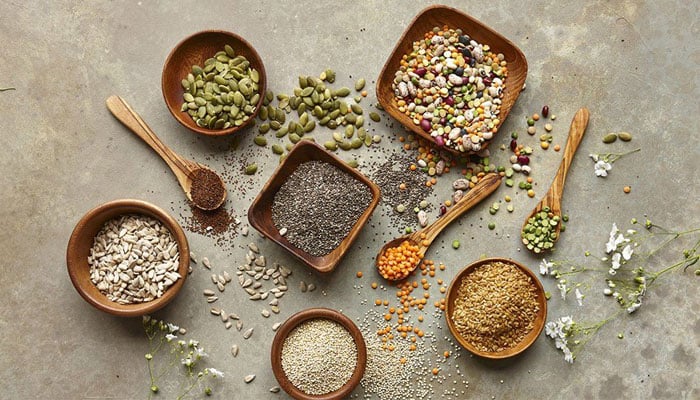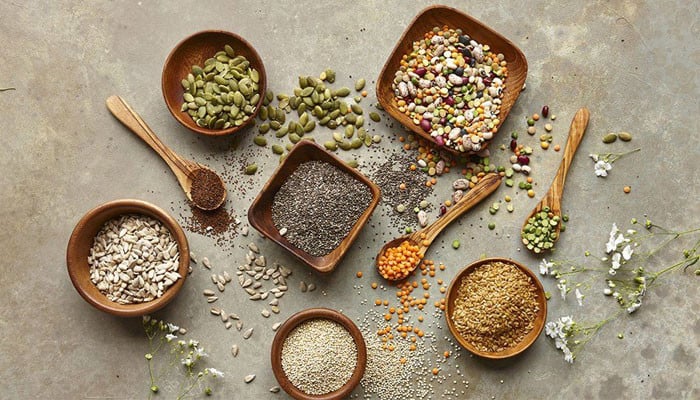
Seeds, including linseed and sesame seeds, contain important nutrients required for human health, which not only improve overall health, but also reduce the risk and treatment of many diseases.
According to medical experts, seeds are rich in nutrients, they are also an excellent source of fiber, various seeds contain healthy fats such as polyunsaturated and monounsaturated fats, they also contain many important vitamins, minerals and antioxidants. There are.
If seeds are included in the diet, they are helpful in reducing blood sugar, cholesterol and blood pressure.
In this report, you will learn about five of the seeds with amazing health benefits that are essential for overall health.
Flax seeds
Flaxseeds, also known as flaxseeds, are a great source of fiber and omega-3 fats, particularly alpha-linolenic acid (ALA), which has been shown to be beneficial for health. goes
The omega-3 in flax is found in the fibrous outer shell of the seed, which is not easily digested by humans. So, if you want to increase your omega-3 levels, it is best to grind flax seeds into a powder and mix them with water. Eat with
According to nutritionists, 1 ounce (28 grams) of flaxseed is packed with nutrients.
One ounce of flaxseed contains 152 calories, 7.8 grams of fiber, 5.2 grams of protein, 2.1 grams of monosaturated fat, 6.5 grams of omega-3, 1.7 grams of omega-6, 35% manganese, 31% thiamine (vitamin B1), 28% magnesium.
Flax seeds also contain a number of different polyphenols, especially lignans, which act as important antioxidants in the body.
The fiber and omega-3 fatty acids in flax seeds can help lower cholesterol and prevent other risk factors for heart disease.
Flax seeds can also help lower blood pressure, 11 studies have found that flax seeds can lower blood pressure, especially when consumed continuously for 12 weeks.
Eating flax seeds can reduce the chances of tumor growth in women with breast cancer and also reduce the risk of other cancers.
Apart from reducing the risk of heart diseases and cancer, flax seeds also help reduce the risk of diabetes.
Chia seeds
Chia seeds are very similar to flax seeds in that they are a good source of fiber and omega-3 fatty acids, as well as many other nutrients.
One ounce (28 grams) of chia seeds contains 137 calories, 10.6 grams of fiber, 4.4 grams of protein, 0.6 grams of monounsaturated fat, 4.9 grams of omega-3 fats, 1.6 grams of omega-6, 15% thiamine (vitamin B1), 30% magnesium and 30% manganese is found.
Like flaxseeds, chia seeds contain a number of important antioxidants such as polyphenols.
Interestingly, several studies have shown that eating chia seeds can increase blood levels of ALA, an important omega-3 fatty acid that helps reduce inflammation.
Another study found that in addition to lowering blood sugar, chia seeds can also reduce appetite.
Chia seeds also reduce heart disease risk factors.
A study of 20 people with type 2 diabetes found that eating 37 grams of chia seeds daily for 12 weeks reduced blood pressure and levels of several inflammatory chemicals.
Sesame seeds
Sesame seeds are commonly used in Asia and in Western countries they are used in the form of a paste.
Like other seeds, they are also rich in nutrients.
One ounce (28 grams) of sesame seeds contains 160 calories, 3.3 grams of fiber, 5 grams of protein, 5.3 grams of monosaturated fat, 6 grams of omega-6 fatty acids, 57 percent copper, 34 percent manganese, and 25 percent magnesium.
Like flaxseeds, sesame seeds contain many lignans, especially one called sesamin. In fact, sesame seeds are the most well-known dietary source of lignans.
Pumpkin seeds
Pumpkin seeds are one of the most commonly eaten types of seeds and are a good source of phosphorus, monounsaturated fats and omega-6.
A 1-ounce (28-gram) serving of pumpkin seeds contains 151 calories, 1.7 grams of fiber, 7 grams of protein, 4 grams of monounsaturated fat, 6 grams of omega-6, 42 percent manganese, 37 percent magnesium, and 33 percent phosphorus.
Pumpkin seeds are also a good source of phytosterols, which are plant compounds that help lower blood cholesterol.
An observational study of more than 8,000 people found that those who consumed more pumpkin and sunflower seeds had a significantly lower risk of breast cancer.
Another study in children found that pumpkin seeds may help reduce the risk of bladder stones by reducing the amount of calcium in the urine.
Sunflower seeds
Sunflower seeds contain good amounts of protein, monosaturated fats and vitamin E.
One ounce (28 grams) of sunflower seeds contains 164 calories, 2.4 grams of fiber, 5.8 grams of protein, 5.2 grams of monosaturated fat, 6.4 grams of omega-6, 47 percent vitamin E, 27 percent manganese, and 23 percent magnesium.
Sunflower seeds reduce inflammation in middle-aged and older people, helping to reduce the risk of heart disease.
A study of more than 6,000 volunteers found that high consumption of nuts and seeds was associated with reduced inflammation.
In particular, consumption of sunflower seeds more than five times a week was associated with lower levels of C-reactive protein (CRP), an important chemical involved in inflammation.
Abstract:
Seeds are an excellent source of healthy fats, plant-based protein, fiber and antioxidant polyphenols.
Additionally, they can help reduce the risk of certain diseases, especially the lignans in certain seeds that help reduce cholesterol and the risk of cancer.
Adding seeds to salads, yogurt, oatmeal and smoothies is a very easy way to use them.
setTimeout(function(){
!function(f,b,e,v,n,t,s)
{if(f.fbq)return;n=f.fbq=function(){n.callMethod?
n.callMethod.apply(n,arguments):n.queue.push(arguments)};
if(!f._fbq)f._fbq=n;n.push=n;n.loaded=!0;n.version=’2.0′;
n.queue=[];t=b.createElement(e);t.async=!0;
t.src=v;s=b.getElementsByTagName(e)[0];
s.parentNode.insertBefore(t,s)}(window,document,’script’,
‘https://connect.facebook.net/en_US/fbevents.js’);
fbq(‘init’, ‘836181349842357’);
fbq(‘track’, ‘PageView’);
}, 6000);
/*setTimeout(function(){
(function (d, s, id) {
var js, fjs = d.getElementsByTagName(s)[0];
if (d.getElementById(id)) return;
js = d.createElement(s);
js.id = id;
js.src = “//connect.facebook.net/en_US/sdk.js#xfbml=1&version=v2.11&appId=580305968816694”;
fjs.parentNode.insertBefore(js, fjs);
}(document, ‘script’, ‘facebook-jssdk’));
}, 4000);*/



